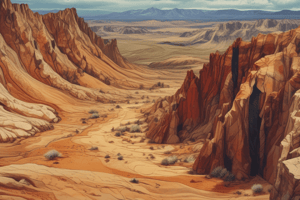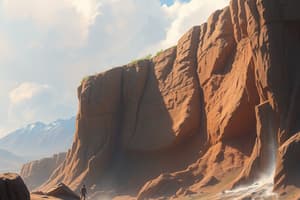Podcast
Questions and Answers
What is the process called when rocks are broken down into smaller pieces by physical forces without changing their chemical makeup?
What is the process called when rocks are broken down into smaller pieces by physical forces without changing their chemical makeup?
- Sedimentation
- Chemical weathering
- Mechanical weathering (correct)
- Erosion
What is the result of sedimentation, when water or wind transports weathered materials?
What is the result of sedimentation, when water or wind transports weathered materials?
- Rock formation
- Clay formation
- Mineral formation
- Soil formation (correct)
What is the primary cause of weathering that changes the chemical makeup of rocks?
What is the primary cause of weathering that changes the chemical makeup of rocks?
- Water
- Wind
- Gravity
- Chemical reactions (correct)
What happens to small particles when water carries them away?
What happens to small particles when water carries them away?
What is the term for the breaking down of rocks and minerals?
What is the term for the breaking down of rocks and minerals?
What is the result of continuous weathering on large rocks?
What is the result of continuous weathering on large rocks?
What is responsible for the breaking of rocks?
What is responsible for the breaking of rocks?
What is the result of mixing sand, silt, or clay with organic material?
What is the result of mixing sand, silt, or clay with organic material?
What is an example of mechanical weathering caused by human activity?
What is an example of mechanical weathering caused by human activity?
What is the term for the process of rocks being broken down into smaller particles?
What is the term for the process of rocks being broken down into smaller particles?
Flashcards are hidden until you start studying
Study Notes
Weathering and Its Effects
- Weathering is the breaking down of rocks and minerals, a slow and continuous process that affects rocks and minerals.
- Weathering crumbles rocks over time, breaking large pieces into smaller ones, common on mountainsides, rivers, and seashores.
Weathering Processes and Outcomes
- Large particles become gravel, medium-sized particles become sand, and small particles become clay due to weathering.
- Water carries small particles away, forming silt.
- When sand, silt, or clay mix with organic material, they become soil.
- Soil forms through sedimentation, where water or wind action transports weathered materials.
Types of Weathering
- There are two types of weathering: mechanical weathering and chemical weathering.
- Agents of weathering, such as gravity, water, wind, ice, plants, animals, people, and chemical reactions, break rocks.
Mechanical Weathering
- Mechanical weathering breaks rocks into small pieces by physical forces without changing their chemical makeup.
- Gravity, water, people, wind, plants, and animals are agents of mechanical weathering.
- Gravity exposes new surfaces of rocks to weathering agents like wind and water, causing huge rocks to roll downhill.
- Evidence for gravity's action includes the rolling of rocks downhill.
Studying That Suits You
Use AI to generate personalized quizzes and flashcards to suit your learning preferences.




